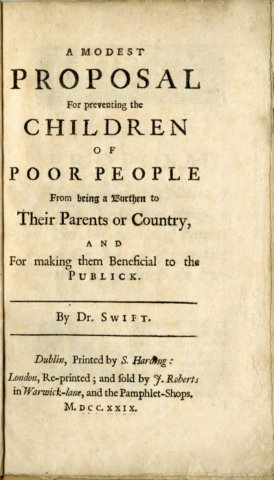Alumnus Paul Sutton (PhD 1999) is the Head of Discipline of environmental and geospatial sciences in the School of Natural and Built Environments at the University of South Australia, and, in the spirit of Jonathan Swift, he has a “modest proposal” vis-a-vis environmental sustainability:
My name is Paul Sutton. I am currently a professor of Environmental Science at the University of South Australia. I’d like to present some ideas on the assignation of dollar values to the natural environment and why I believe this kind of work can help us appreciate our fundamental dependence upon nature for our livelihood and well-being.
I will provide a touch of background information about myself as context. I was born in Los Angeles in 1961. As a child living in the Hollywood Hills I was subject to smog alerts in which bells rang while I was out playing on the school ground informing me in an alarming way – It’s not safe to breath and exercise because the air is polluted. Please come inside now and keep calm. Once inside we then proceeded to do duck and cover exercises for the potential nuclear war we might engage in with the then Soviet Union.
When I watched television as a child I remember a public service commercial with a teary eyed noble Native American looking at things like trash and litter on the streets, billowing smoke stacks, polluted rivers, and perhaps even the Cuyahoga river on fire. In the movie theaters of the day movies like ‘Soylent Green’ presented bleak future scenarios. In 1969 a major oil spill took place up the coast from me in Santa Barbara. Many believe this event set the stage for the nascent Earth Day movement. The first Earth Day took place in 1970.
Needless to say, the environmental movement was vibrant during my formative years, and I believe we have made substantial progress as a result of it. However, we have not made enough progress. Global assessments of the state of the world’s environment are unequivocal in stating that the earth’s ecosystems are continuing to degrade despite some progress. I am often disdainfully accused of being a hippie-tree-hugging-environmentalist-extremist who espouses policies that would impoverish humanity. Nonetheless, I feel as if I am a member of a large fraction of the population who have made a losing argument for environmental sustainability. I say that we have lost the argument because our collective behavior as a species does not suggest that we believe the severity of the environmental threat nor do we believe that addressing the environmental threat will actually improve our overall well-being. In a broad and over-generalized sense I would say that the environmental scientists have lost a very important argument to the economists. I also believe that losing the argument does not mean that we were wrong.
Arthur Schopenhauer is credited with saying: All truth passes through three stages. First, it is ridiculed. Second it is violently opposed. Third, it is accepted as being self-evident. Many would argue that the debate around anthropogenically driven climate change is moving through all three of these stages. I am convinced that most of the fundamental tenets of what might be broadly categorized as the ‘Environmental Movement’ are basically true (e.g. exceeding carrying capacity bad, loss of biodiversity bad, climate change bad, etc.).
In my opinion, the environmental scientists have lost an argument with the economic rationalists that will have profound, significant, and unstoppable negative consequences for human well-being long into the future. In the spirit of the saying: ‘When in Rome, do as the Romans do’ I present the following ‘modest proposal’ to economic rationalists.
A modest proposal: kill all the bees.
It may come as a surprise to you but killing off the bees actually makes economic sense. This has to do with the dollar value of the ecosystem services provided by bees. Many people have difficulty wrapping their head around how one might put a dollar value on an ecosystem service. Insect pollination is a standard example of an ecosystem service. Insects pollinate our crops for free. If honeybees were to go extinct we would need to find some other way to pollinate honeybee dependent crops – perhaps armies of people wandering from plant to plant with small pollen covered paintbrushes.
Some basic questions can be very difficult to answer regarding the loss of pollination services. For example: Can the value of the pollination services exceed the current value of the crops? How will the prices of the crops change as supplies dwindle and pollinators disappear? The dynamics of these scenarios complicate estimating the value of these services and these estimates can consequently vary substantially.
Nonetheless, one estimate is the labor cost to pay people to use pollen covered paintbrushes. Many estimates of the dollar value of the ecosystem service regarded as insect pollination exceed $200 billion annually. It is perhaps a tad facetious to suggest that current neo-liberal institutions (i.e. the economists) would endorse the modest proposal suggested in the title of this piece: “Kill all the bees”.
If bees were to go extinct and disappear it is very likely that many humans would be employed in the task of pollination. This would be a ‘win-win-win’ scenario from a strictly economic perspective: 1) it increases gross domestic product, 2) it creates jobs, and 3) it generates tax revenue. Whilst there may only be a few economists that would seriously argue for this policy it must be recognized that if bees truly did go extinct – It would increase GDP, it would create jobs, and it would generate tax revenue.



